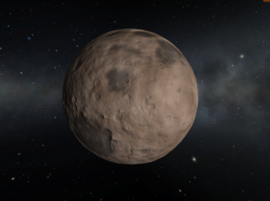Difference between revisions of "Moho"
m (→Naming: italicized important part) |
m |
||
| Line 21: | Line 21: | ||
Moho has a very deep well at its geographic north pole, called the [[Mohole]] by fans in reference to [https://en.wikipedia.org/wiki/Project_Mohole Project Mohole], and the Northern Sinkhole by [[Science|scientific instruments]]. Despite, according to the [[Map View]], the apparent existence of another hole at the geographic south pole, one does not exist. The Mohole is about 4.6 kilometers deep.<ref>“[[thread:48006|Moho's Secrets Revealed]]” </ref> The hole is a glitch in the procedural generation of terrain; many other bodies with land at the north pole have similar bugs.<ref>https://www.youtube.com/watch?v=-e5SGynBJ4Y</ref> | Moho has a very deep well at its geographic north pole, called the [[Mohole]] by fans in reference to [https://en.wikipedia.org/wiki/Project_Mohole Project Mohole], and the Northern Sinkhole by [[Science|scientific instruments]]. Despite, according to the [[Map View]], the apparent existence of another hole at the geographic south pole, one does not exist. The Mohole is about 4.6 kilometers deep.<ref>“[[thread:48006|Moho's Secrets Revealed]]” </ref> The hole is a glitch in the procedural generation of terrain; many other bodies with land at the north pole have similar bugs.<ref>https://www.youtube.com/watch?v=-e5SGynBJ4Y</ref> | ||
| − | The Mohole can destroy craft and Kerbals that fall into it. | + | The Mohole can destroy craft and kill Kerbals that fall into it. |
== Biomes == | == Biomes == | ||
Revision as of 19:46, 13 February 2016
| Moho | ||
| Moho as seen from orbit. | ||
| Planet of Kerbol | ||
| Orbital Characteristics | ||
| Semi-major axis | 5 263 138 304 m [Note 1] | |
| Apoapsis | 6 315 765 981 m [Note 1] | |
| Periapsis | 4 210 510 628 m [Note 1] | |
| Orbital eccentricity | 0.2 | |
| Orbital inclination | 7 ° | |
| Argument of periapsis | 15 ° | |
| Longitude of the ascending node | 70 ° | |
| Mean anomaly | 3.14 rad (at 0s UT) | |
| Sidereal orbital period | 2 215 754 s | |
| 102 d 3 h 29 m 14.2 s | ||
| Synodic orbital period | 2 918 346.4 s | |
| Orbital velocity | 12 186 - 18 279 m/s | |
| Physical Characteristics | ||
| Equatorial radius | 250 000 m | |
| Equatorial circumference | 1 570 796 m | |
| Surface area | 7.8539816×1011 m2 | |
| Mass | 2.5263314×1021 kg | |
| Standard gravitational parameter | 1.6860938×1011 m3/s2 | |
| Density | 38 599.500 kg/m3 | |
| Surface gravity | 2.70 m/s2 (0.275 g) | |
| Escape velocity | 1 161.41 m/s | |
| Sidereal rotation period | 1 210 000.0 s | |
| 56 d 0 h 6 m 40 s | ||
| Solar day | 2 665 723.4 s | |
| 123 d 2 h 28 m 43.4 s | ||
| Sidereal rotational velocity | 1.2982 m/s | |
| Synchronous orbit | Outside sphere of influence | |
| Sphere of influence | 9 646 663.0 m [Note 1] | |
| Atmospheric Characteristics | ||
| Atmosphere present | No | |
| Scientific multiplier | ||
| Surface | 10 | |
| Splashed | N/A | |
| Near space | 8 | |
| Outer space | 7 | |
| Recovery | 7 | |
|
| ||
Moho is the innermost planet of the Kerbol star system and the Mercury analogue for Kerbal Space Program. It lacks an atmosphere and natural satellites.
Moho's inclined and eccentric orbit, lack of atmosphere, (for aerobraking) or moons (for gravity assists) make encountering the planet a very difficult endeavor.
Contents
In-game Description
| “ | Moho figures in Kerbal mythology as a fiery place with oceans of flowing lava. In reality, however, it's much less interesting. Scientists speculate about possible ways to make it awesome like in the stories. Some of those ideas have led to new breakthroughs in aerospace technology. |
” |
Naming
Moho gets its name from the Mohorovičić discontinuity; the boundary between the Earth's crust and mantle.
Topography
Moho's surface ranges from light brown highlands to dark brown basins, possibly the product of volcanism. Its highest point is in its northern hemisphere at an altitude of 6817 m. Moho's heavy cratering suggests erosion. Tidal friction with Kerbol most likely causes airless Moho's erosion by inducing volcanic periods that fill craters.
Moho has a very deep well at its geographic north pole, called the Mohole by fans in reference to Project Mohole, and the Northern Sinkhole by scientific instruments. Despite, according to the Map View, the apparent existence of another hole at the geographic south pole, one does not exist. The Mohole is about 4.6 kilometers deep.[1] The hole is a glitch in the procedural generation of terrain; many other bodies with land at the north pole have similar bugs.[2]
The Mohole can destroy craft and kill Kerbals that fall into it.
Biomes
Moho has 12 biomes. It is one of two bodies (the other being Ike) that have their own North and South Pole biome.
Biome list
|
Orbital Statistics
Mohosynchronous and semi-synchronous orbits are impossible — they would require altitudes of 18 182.08 km and 11 361.48 km respectively, both of which are beyond Moho's sphere of influence.
Reference Frames
| Time warp | Minimum Altitude |
|---|---|
| 1× | Any |
| 5× | 10 000 m |
| 10× | 10 000 m |
| 50× | 30 000 m |
| 100× | 50 000 m |
| 1 000× | 100 000 m |
| 10 000× | 200 000 m |
| 100 000× | 300 000 m |
Solar System Counterpart
Moho is the apparent Kerbol System analog of the planet Mercury. Both share a similar cratered landscape, like most bodies with little to no atmosphere. Due to the lack of an atmosphere to retain heat, Moho and Mercury are freezing on the night side and, relative to Earth, extremely hot on the day side. Both planets are the closest to their respective stars and lack natural satellites.
However, Moho has a brown surface, while Mercury has a dark grey surface. In addition, Mercury has a tenuous atmosphere of about 10⁻¹³ kPa while Moho has no atmosphere; although, a pressure of 10⁻¹³ kPa (≃ 10⁻¹⁵ atm) would be rendered "unmeasurable" by the PresMat Barometer and register in KSP as a vacuum.
Gallery
Bill Kerman having the time of his life wedged in the Northern Mohole.
Hanny Kerman wedged in the Northern Mohole sideways. Lots of orientation jittering was observed.
Changes
- Added biomes
- New, procedurally generated, textures added, with higher detail craters.
- Entirely changed more cratered surface.
- Color changed from red to brown.
- No more superheated atmosphere.
- No longer tidally locked.
- Mass reduced.
- Initial Release








